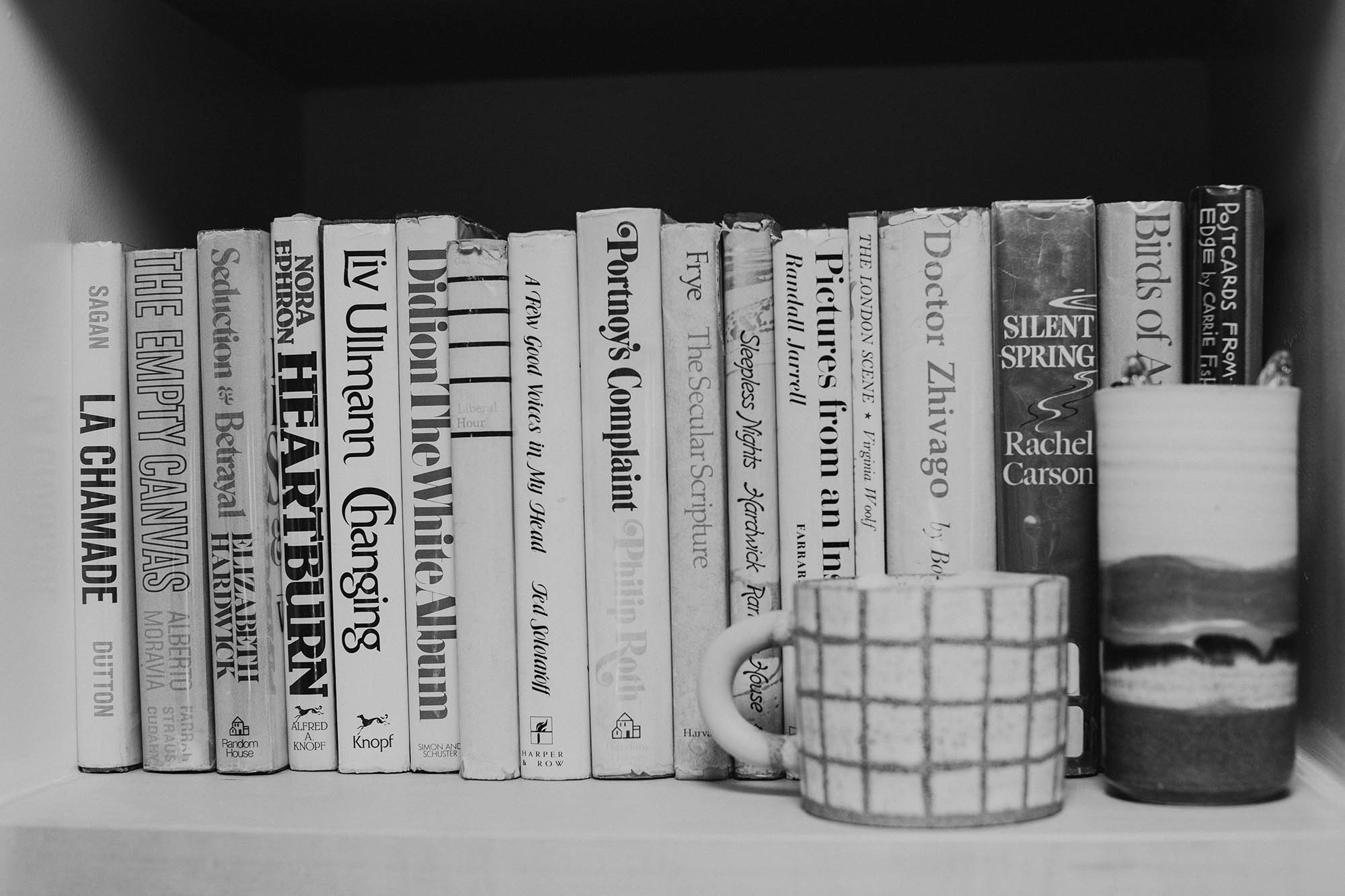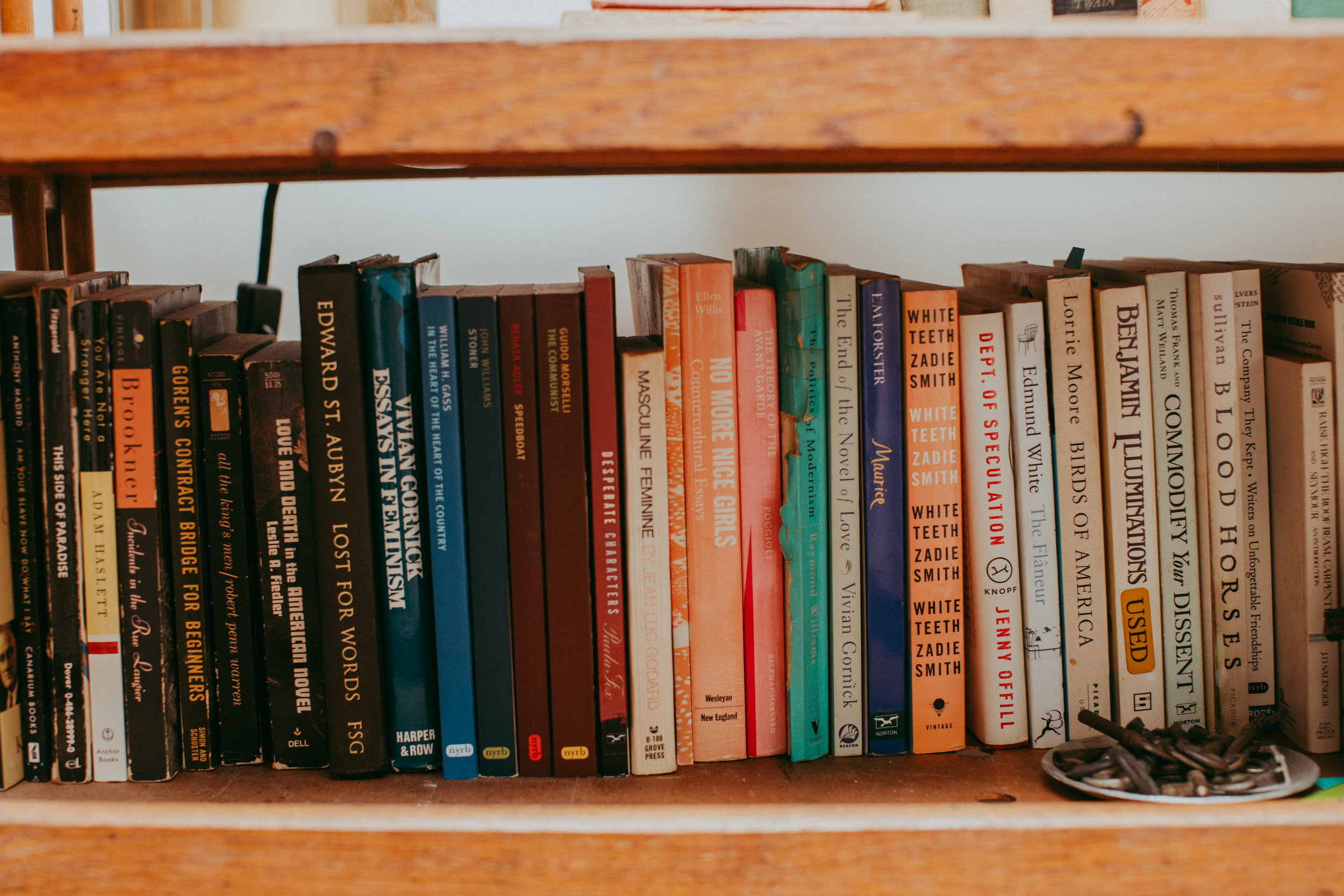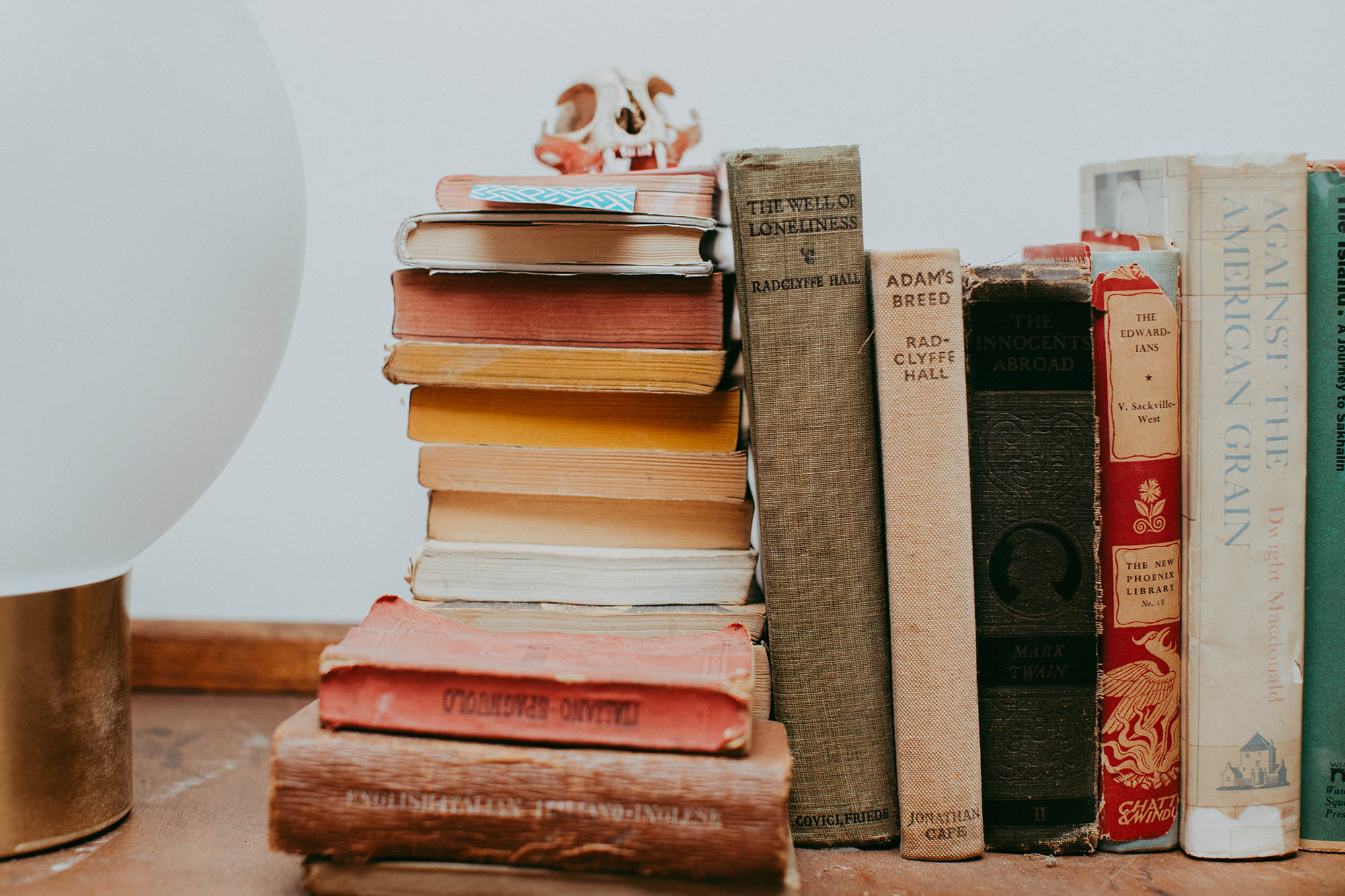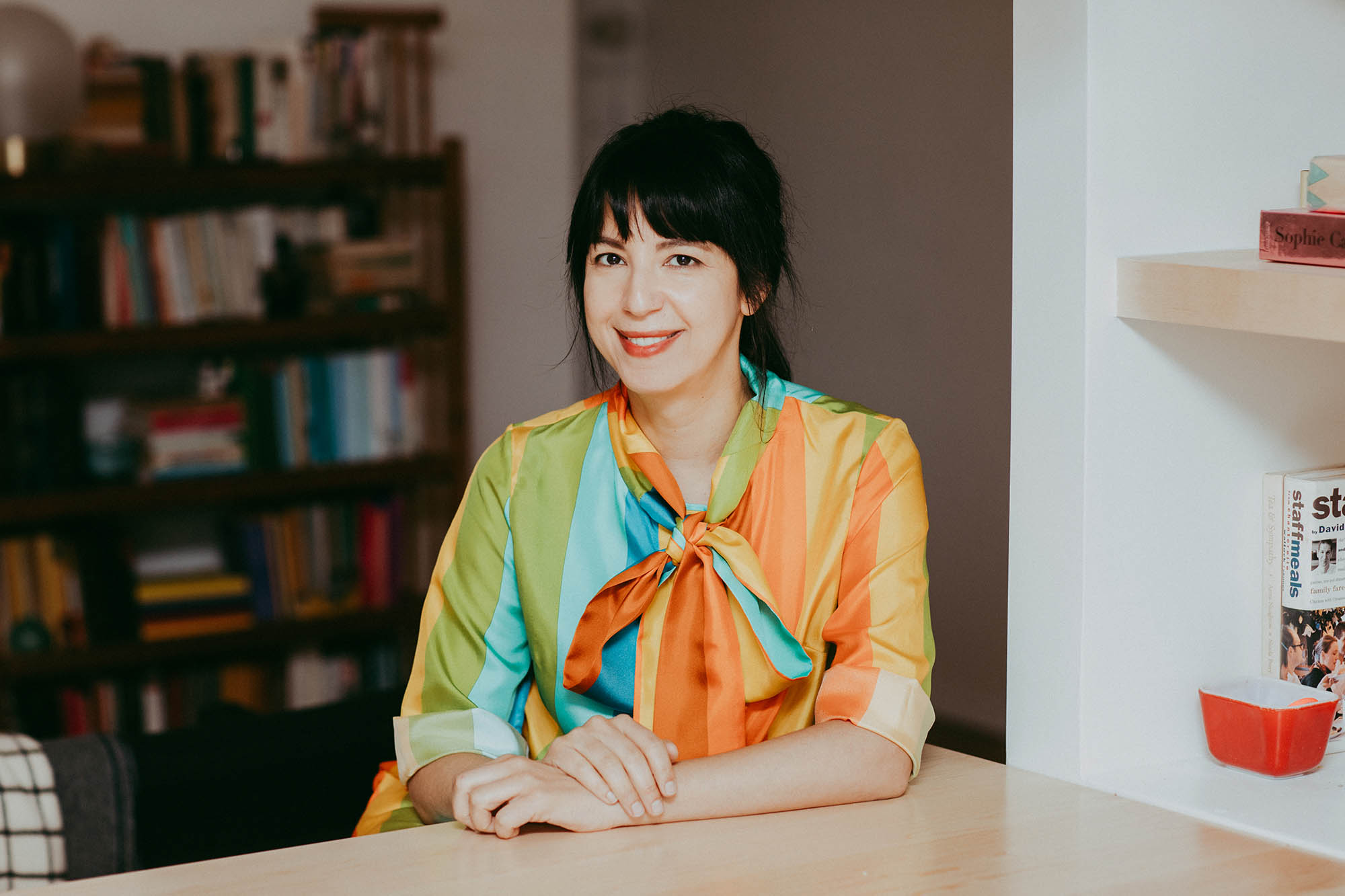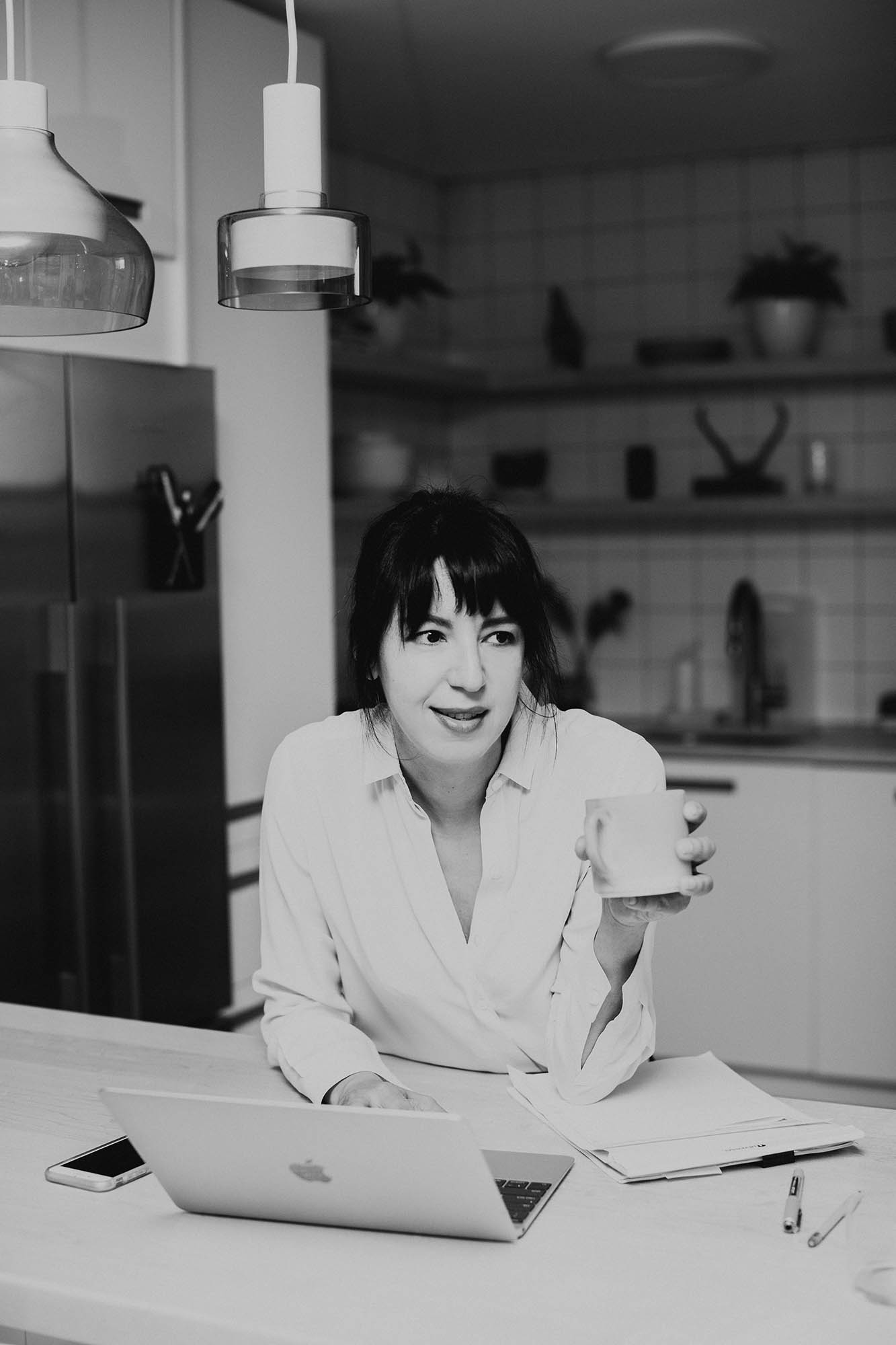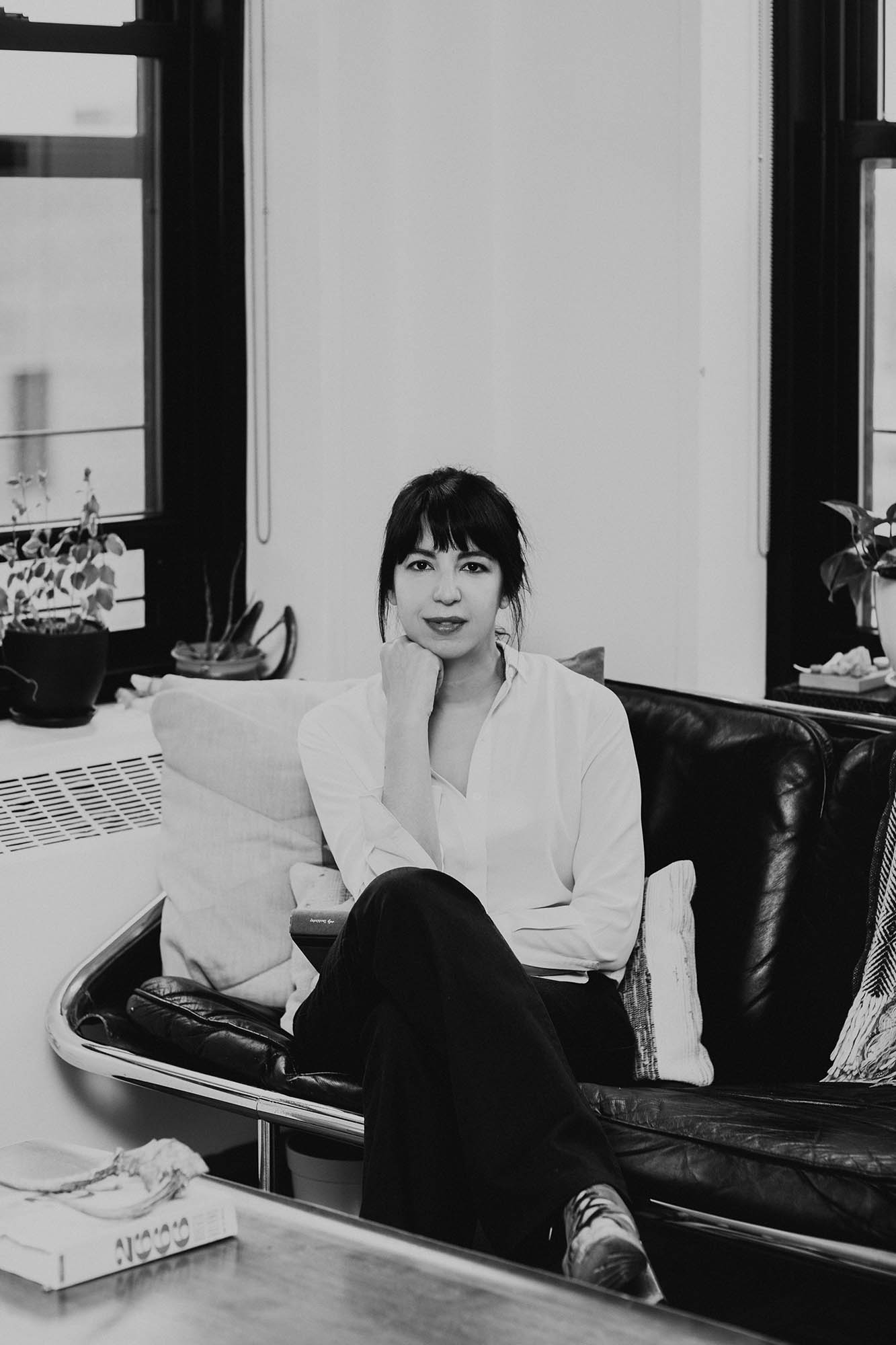
Mel Flashman
Mel Flashman is a literary agent for Janklow & Nesbit Associates where she represents authors like Stephanie Danler (of Sweetbitter fame) and Stanley Fish (literary theory, anyone?). She grew up in Kentucky, biding her time until she could move to the place where interesting narratives happen. According to the books she liked to read, those narratives occur mostly in cities. Mel’s inner child would be thrilled to hear that adult Mel now lives in New York City and loves it just as much as child Mel thought she would.
Photography by Sylvie Rosokoff
Girls at Library: What books bring you joy right now?
Mel Flashman: I spent some time in the music world, more so in high school and college, and there's a tone in music that I also appreciate in writing. The best way I can describe it is an anthemic elegiac. So the song I think about is The Jesus and Mary Chain's song 'Head On'. And literary non-fiction and fiction can have this I think, the elegiac. I reread the opening and closing sections of The Great Gatsby and I think no one does elegiac better than F. Scott Fitzgerald when he's really being edited by his editor.
GAL: I can see that.
MF: There are some brilliantly anthemic moments in Gatsby. Another good example is the novel Sweetbitter, which has an anthemic and elegiac tone. I gravitate towards that and become absorbed by it. What really brings me joy is having a novel that transports me so that I can't do anything other than read. It's that same feeling of being a kid, where you have so much time you can read the sixteen books you got from the library, and are completely transported.
GAL: What are three nonfiction books that every GAL reader should read right now?
MF: Oh! This is my favorite topic. I would say Ellen Willis's No More Nice Girls first female rock critic, a New Yorker. A great writer on feminism and a great writer in general, but I would start with No More Nice Girls. I think back in the day both Astra Taylor and maybe Emily Gould told me to read her and I feel like everyone who reads her, loves her. She’s sort of firing on all engines.
I haven't read Susan Faludi's Backlash in a long time. And I read it way after it came out, but found it very smart on the advances women made in the 70's and 80's, and the backlash against that. Which is sadly, I think, newly important.
The Kavanaugh hearings were tough. I grew up in the 90's in Kentucky and I thought we were past all of that when I was 15. I remember watching many of the Anita Hill trials and thinking; “oh this is really tragic, but everyone knows now, and by the time I'm a grown-up this won't be an issue at all.” So, that was pretty naïve of me. I think Susan Faludi would be a good person to add to anyone’s reading list. Fear of Falling by Barbara Ehrenreich is another one. I haven’t read it since college but definitely recommend it. She's so smart both politically and about (and I believe this is how she describes it) the anxieties of what she calls a professional managerial class. I presume I belong to it at this point. I remember just being blown away by her thinking and writing. She's so smart.
photo by: Sylvie Rosokoff
GAL: Is truth stranger than fiction?
MF: Oh gosh. Judging by the headlines today, yes.
GAL: Does the reality of what sells best on the book market disappoint you?
MF: Yeah, often.
GAL: What percentage of the time does the market disappoint you?
MF: I would say 30%.
MF: Yeah, often.
GAL: That's not as high as I thought maybe it might be, so that's interesting. Can you explain how you work within its constraints?
MF: A novelist once said that I have a sociological imagination. I think she meant that when I think of explaining someone or a situation that's not always to my liking, I will give a long account of 'Oh well, their mother beat them or their boyfriend up' etc., and I think it's easy for me to make the case for it, even when editors pass on projects. In many of the cases I can understand why they pass even if I don't agree with them. Often they've got to please their bosses and you don't want a book that's going to end up at a house where the only person supporting it is the editor.
GAL: Why is that?
MF: You want to aim for a general enthusiasm in the publishing house. It supports the book and the author better.
GAL: It sounds very collaborative.
MF: It is, and when it works out, you know, it's the best kind of collaboration.
GAL: What are you reading right now?
MF: I just finished The Bay of Noon by Shirley Hazzard, her 1970 love triangle parallelogram set in Naples. It was amazing.
GAL: She's a wonderful writer.
MF: She is remarkable, and we represent her too. I got the book from Lynn Nesbit, down the hall. It's just a beautiful book. So that's what I finished and then, yeah, we'll see what happens at Christmas.
GAL: How many books do you typically read at once, given that it's basically your job to read?
MF: I have a reading pile, like most agents and editors, that’s sort of endless. I've probably got three or four novels on submission right now that I am really excited to read, and then a lot of other novels I just have no idea about until I open them. And then, actual published books, I don't know if it's a good or bad habit, but I do that thing where I've started five books. I'm in the middle of Alan Hollinghurst's Line of Beauty, which I started this summer and loved, but just haven't finished. I'm in the middle of The Color of Law by Richard Rothstein, serious nonfiction.
GAL: What does your nightstand look like?
MF: I've just renovated my apartment, so I'm looking for new nightstands, but I have these little old fashioned crates that I'm using right now. They have books that can go, sort of, inside and actually to be honest, I have no idea what's in there. There's nothing on my bookstand because I have this ceramic air humidifier that looks vaguely 70's Italian Modern. That’s basically all there's room for on my tiny little nightstand. Since I renovated my apartment, I took out all the overhead lighting and put in awfully dim wall sconces. I didn't use a designer for that part, and I should have, because the lighting is not great for reading yet, and I haven't gotten around to buying lamps. So I currently do that terrible thing where I listen to podcasts when I go to sleep. It’s really terrible.
GAL: Why is that terrible?
MF: I feel like listening to political podcasts before you go to bed-
GAL: Yeah. That is terrible. You're going to give yourself a heart attack.
MF: Yeah. I love Pod Save America, but it's not a great bedtime listening.
“I think social media has infused books in an interesting way. And I’m all for that.”
GAL: What are the most challenging aspects about being a literary agent?
MF: Time management is the most challenging. I feel like I have several methods that I'm always yammering on about. There's the Pomodoro Method where you measure out your reading and to-do lists in 25- minute increments, which works pretty well for me.
GAL: I use that too, and swear by it.
MF: I love it! I set my little Pomodoro timer on my iPad and get to work. My boyfriend taught the method to me. We would spend a whole Saturday doing the Pomodoro Method, working on our separate projects, which worked pretty well because someone was watching you. Then you'd take a break together for five minutes, which felt nice. I had that Bullet Journal book from an editor and I have many journals that use that dot pattern, so I'm trying to learn that, but I haven't worked it into my time management routine to learn how to use another one.
GAL: That's hilarious. The 21st century in a nutshell right there.
MF: Yeah, so it's a combination of time management and then having a sense of the market for a particular book, whether it's fiction or non-fiction, and then being able to integrate that into the sort of projects I take on, but also with the existing authors I represent, conveying that info to them. So it might mean with a certain kind of book waiting, holding it away for a while until the appetite for that sort of book resurfaces. I was very very briefly a trend-spotter, or a cool-hunter. It's that kind of being ahead, like on the bleeding edge of trends. In the publishing world you could be way too early, so that's something I try to think about.
GAL: Do you have any ceremonies attached to the process of reading while at home?
MF: I used to pride myself on having the habits of a teenage boy, which is to say I didn't care about cleaning up and that sort of thing. Then I renovated my apartment last year, and my teenage boy disappeared. It’s a bright and airy apartment. I am a super morning person, so I wake up really early, often during the last hours of darkness. I go into my bright kitchen and turn on all the dimmer switches, and then I heat up the little kettle and pour my coffee. This part doesn’t sound joyful but it is: if there are any little dishes that need to be put away, I put them away. Then I either go read at the kitchen island, or to the sofa that’s in a corner with windows on either side. Most of the people who have the same apartment layout make that corner area a dining room, which is the obvious thing to put there given its relationship to the kitchen. But I was determined to put two sofas in the living room, and needed to put one of them in that corner. The fantasy of reading there was too appealing.
photo by: Sylvie Rosokoff
reading the Prune cookbook
GAL: Why do you read?
MF: I think a lot of people who work in publishing wanted to be writers. At least that's what you hear. I never wanted to be a writer. I also love personality tests, and most of the tests that I take I end up being some sort of person who likes systems.
GAL: (laughter) What Myers-Briggs are you?
MF: An INTJ! [laughs] I think a lot of the books I read are ones suited for a PhD in English. I’m also a huge nerd and love politics and taxonomies, so I read a lot of pretty serious non-fiction. I like to know how things work. I think that at the end of the day it's a control. It's like a way of control.
GAL: Mm-hmm. But, as you described earlier, you also read as an escape from the world?
MF: Exactly. Reading the Ferrante novels was pure escape and then a lot of the non-fiction I read is probably to have a sense of control over the situation.
GAL: What do you think the future of storytelling looks like?
MF: Oh we talk about that a lot at Janklow Nesbit. I think podcasts are more or less the model. It's roughly the same model as radio. I used to work in college radio and podcasts don't seem completely new, as much as we see them as a new form. I think about it in terms of how we studied it in narratology classes and Russian Formalism classes in college. This idea that there are like, 18 stories out there. Man versus Nature. Man versus State. Man versus Man. And I think that's probably true, no matter what the format is. I am not a player of video games and never was, but I think that's a type of storytelling.
It's not what I'm particularly interested in, but it’s still an important form. They have beginnings, middles, and ends, and the essence of whatever device is being used isn’t always important. You know, I think social media has infused books in an interesting way. And I'm all for that.
GAL: So, no radical changes?
MF: It's not different from what the modernists were doing when they, like Virginia Woolf for example, sat around thinking about the gramophone.
GAL: Yes.
MF: It’s the same thing with different technology. So I don't know if I think there's anything like radically new about storytelling. I think more people have access to it, which is great. It's more democratic which is nice. And I think if you're an agent or an editor, you can find new writers in a lot of different places which is good.
GAL: Is there a dark horse book of the year that you think everyone missed out on?
MF: Well, this is one of my books, so, I am perhaps biased. And it certainly got a lot of attention but I feel like it should have gotten a lot more. Bullshit Jobs by David Graeber who is always a fun read. It’s one of those books that everyone should read. But because he's mostly in London, it got more attention in Europe.
I think Anne Boyer is another author to watch carefully. I represent her but her next book The Undying will be huge. She has a book that was published by, I believe, Ugly Duckling Presse, called A Handbook of Disappointed Fate, which I didn't sell. I started representing her after that book. I've seen people start to quote her work on Instagram and I think she's someone we'll hear about a lot more next year when The Undying is published.
“The Westing Game made me want to move to the city.
I was like “I’m going to live in an apartment!” And I do.”
GAL: What was the first book that you fell in love with that turned you into lifelong reader?
MF: I learned how to read really early because my mom was a teacher. I think that I was her project, but I loved it! I loved the power of being able to read. I read everything I could get my hands on as a kid, like the encyclopedias from 1962 that my grandparents gave us. They were probably missing a volume and JFK was the last president. I don't even think he had died yet when these were published. But the first book that I just loved was The Westing Game.
GAL: Oh yeah! Ellen Raskin!
MF: I love it! There is one thing about that book; I don't know if I was already a reader, but the thing that it did introduce me to was the idea that I could live in an apartment. I grew up in a suburban southern city separated from other houses by big lawns. Everyone was so far apart. The idea that you could go out your door and find other people living behind doors inside your building, and there would be a game that you were playing really captivated my imagination. I have to go back and read it, but I think Turtle Wexler lives in an apartment building on Lake Michigan. I could be wrong about that.
GAL: I don't remember.
MF: I need to go back and look it up. But, in my mind, as a little kid, what I pictured was a six-story glass apartment building in the woods, on a pond. Which sort of combined the urban fantasy with the upstate cabin in the woods fantasy. The Westing Game made me want to move to the city. I was like I'm going to live in an apartment! And I do.
GAL: Yeah, you made it come true! It opened your life into a what could be possible question about your own future.
MF: Yeah, I definitely wanted to live in an apartment building.
GAL: Isn't that funny, what our young minds sort of hang on to and become obsessed with?
MF: Yes. An apartment building is also a great set up for a story. I mean all these stories going on behind different doors!
GAL: There are so many different ways it can go, too. Like Hitchcock’s Rear Window. Such an effective apartment building narrative. The Westing Game formed your love for finding and discovering narrative.
MF: Yeah, it did. I love that book.
photo by: Sylvie Rosokoff
GAL: What's the power of story? Describe some ways in which fictional narratives have impacted you and your life.
MF: I read a lot of classic literature as a kid. I had a lot of free time growing up. I must have gone to school, though. My mom was always saying, "Gosh! You guys never have homework." And I think that was pretty true, or we didn't really do it, or I don't know. But, I had a lot of time to just read whatever I wanted. And I read a lot of the greatest hits of American and British Modernism. Like, The Great Gatsby and The Sun Also Rises, and A Farewell to Arms.
GAL: All men.
MF: All men. I definitely read a lot of Virginia Woolf when I got to college.
GAL: Kids aren't introduced to classic female authors early enough. It’s not your fault though, it’s what teachers teach and what is typical of American curriculum.
MF: It's a good point. I definitely read all of the Laura Ingalls Wilder books, which I later learned are part of some semi-conservative conspiracy but, love them anyway. I also read The Babysitters Club and Nancy Drew. The fantasy in Modernist writing of people from the Provinces moving to a city, which I enjoyed in those greatest hits. Again, the city captivated me, and I could envision my future self. I was basically going to also go to a city. And go out until 3:00am. I didn't really have a city in mind. In my mind it could have been Atlanta or San Francisco, or New York, or Paris. I knew that I would have a boyfriend, and maybe would do something romantic like play the violin or study philosophy. I also imagined myself to be a corporate lawyer which is funny to think about now. Henry James writes about moving to a city and meeting a whole group of sort of artists and intellectuals, and just interesting people. By the time I was in high school my small town had 5 high schools which felt exciting because we met kids from all the other schools. But by the time I was a junior or senior, I felt like I had exhausted all the possibilities for friendship or potential boyfriends. I was ready to move to a city.
GAL: Is the city everything you hoped it would be?
MF: Oh yeah. I mean I love all cities. I think it took me a couple years to really cotton to New York. I went to school for a semester at Columbia as an exchange student in college. And the city was okay; it was a different period, gentrification had not really touched most of the city at that point. I also lived in Milan as an exchange student for one semester. I lived in an apartment building instead of the dorms. And now that I think of it, I was pretty miserable in both of those cities, but I think that was just because I was a 21 year old.
I do remember what I loved to do in both cities very clearly and with fondness. My boyfriend and I recently spent five days walking all around Naples and Berlin, and I love nothing more than just walking around the city for hours and hours. I found that little app on my phone yesterday night that tells you how many steps you’ve walked. On two of the days in Naples we had walked well over 20 thousand steps and a lot of those steps were up and down the city, because it's almost a vertical city. But, that's one thing I love about cities: you don't actually have to interact closely with people to understand and enjoy it.
If you're an INTJ like I am, you're kind of an introvert and don't necessarily want to talk to everyone. However, I like the idea that everyone's around me, like I love walking into a bar in the city with a book. I know there have been all these recent articles about women saying, “it's okay, you can go sit at a bar by yourself.” It never occurred to me that I couldn't do that. And you know, I think I read a lot of literature by dudes and just assumed I was going to do the same things, because feminism had already solved everything by 1994. [laughs]
It simply didn't occur to me that that was weird to sit alone. So I would say the city is…
GAL: Everything you hoped it would be.
MF: It's definitely everything. I really do like to get out of the city, but I would go crazy if I just lived outside of it.
photo by: Sylvie Rosokoff
GAL: Do you have any wisdom you can share for anyone who either wants to get their book into the hands of a literary agent, or to become a literary agent?
MF: Let’s go with the first category. If they want to get in touch with a literary agent, it's a very, for the most part, specialized industry. It's very small. There aren't that many literary agents.
GAL: Right.
MF: And each agent usually works in a specific category. I do literary fiction and nonfiction, but some other categories as well. There are many, many agents who do literary fiction and nonfiction, but I also represent business, finance, and economic books. There are probably like five to ten agents who even care about that kind of book.
GAL: How might they meet an agent that would take them on?
MF: The best thing to do to find an agent who has sold similar books to yours, because their contacts in the sense of the space and the audience for your book will probably be more specific and beneficial.
Like, if someone sent me a fantasy novel, I wouldn’t be able to do anything with it. I just wouldn't know a good fantasy novel if it punched me in the face. But, I have three or four colleagues who are well-read in fantasy, love it, know what they're looking for, know what the market is like.
GAL: Yes. So find someone, find an agent that does similar work to your own.
MF: Yeah! Look in the acknowledgement section of most novels that you think are similar to yours for names. I mean, usually now it's even easier, you can just Google author pages and it might say who their agent is. Authors do stick their agent in the back of the book, then you can look up the agent and see what else they've sold. I tend to get a lot of referrals. But I do email a lot of people whose pieces I've read. Writers who's work I like. But it's all very targeted. It's like, if you want to get married and have kids, you wouldn't date a guy who doesn't.
GAL: Yeah.
MF: It's kind of like, you're like, finding an agent like you want to find the agent who is going to be most excited about what you're writing. So someone with a similar sensibility.
GAL: Is it important for you to physically hold a book that you read?
MF: I read short pieces on my iPad mini and I read the New York Times on my phone. I will use the mini to read manuscripts, only because I try to keep weight off my back, I hate carrying things on my shoulders. So I may read a first draft of a submission, maybe, on a device. But, I really don't like reading on them for anything else. I really prefer a book. Preferably a paperback.
GAL: If you were to write your memoir, despite never wanting to be a writer, what would you title it and why?
MF: I will never write a memoir. I will never write a book. I really don't like writing.
GAL: Yeah okay. That's fair.
MF: But, so, my memoir…
GAL: You want to play the game?
MF: Yeah. I will. It would probably be something terribly earnest and anthemic. So, I don't know, I have to think about it. But it's definitely an annoying combination of earnest and pretentious. There is never enough time. It would be something like that.
Featured Books
Featured Pods & More
More Like This





